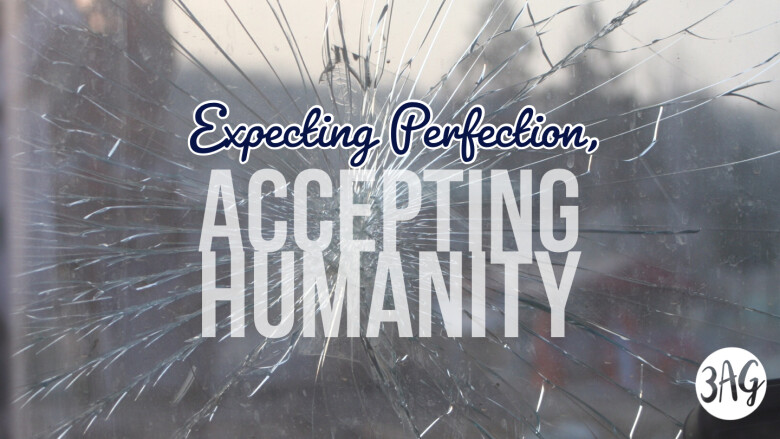Repairing Relationships
Matthew 5:23-24
Expecting Perfection, Accepting Humanity
Part 7: Repairing Relationships ~ May 19, 2019
Welcome to part seven of our series, “Expecting Perfection, Accepting Humanity.” I admit that I am partial to the title, but I want to remind you that it did not originate with me. I came across it more than 30 years ago in one of Chuck Swindoll’s devotionals and it has stuck with me all these years.
I shared part of an entry from that devotional in the first message of this series. Let me share it with you again: [PRO] How very easy it is to manipulate and even victimize our brothers and sisters! How quickly the thin thread of freedom snaps as
When I read that, I can’t help but think that we can be pretty hard on people...and we’re often hardest on those we love the most. Sometimes, we expect perfection from others while excusing our own imperfections. Sometimes, we expect perfection from ourselves and others. Sometimes, we expect perfection from ourselves while allowing for others’ imperfections. Regardless of where you might fall, I think we can all agree that people hurt people.
Sometimes, we hurt others intentionally and sometimes we do so unintentionally. It’s a shame, but it’s
Scripture has a lot to say about the importance of human relationships.
- We read in Genesis 2, that it is not good for man to be alone.
- We read in Ecclesiastes 4 that two are better than one, if one falls down, one can help the other up.
- We read Jesus’ words that there is no greater love than to lay down your life for your friends.
We need close personal relationships in our lives. Unfortunately, relationships come with the near certainty of hurt and disappointment because we are broken and sinful and even after we come to know Christ as Savior, we bring baggage with us and sometimes even continue to pick up baggage along the way.
In this series, we are introducing eight choices we need to make to unpack our baggage and deal with it in healthy, productive, godly ways. These are the
- Admitting need
- Getting help
- Letting go
- Coming clean
- Making changes
- Repairing relationships
- Maintaining momentum
- Recycling pain
Today, we are looking at choice #6, repairing relationships.
There are so many things that could be said about repairing relationships, but we are going to limit ourselves to two things this morning. Before we get to them however, I want us to look at a passage of Scripture that shows Christians that repairing relationships is a big deal and it’s something God expects of us.
Matthew 5:23-24 (NIV, page 684 ) – “Therefore, if you are offering your gift at the altar and there remember that your brother or sister has something against you, leave your gift there in front of the altar.
Look at how Eugene Peterson rendered that in The Message translation, [PRO] “This is how I want you to conduct yourself in these matters. If you enter your place of worship and, about to make an offering, you suddenly remember a grudge a friend has against you, abandon your offering, leave immediately, go to this friend and make things right. Then and only then, come back and work things out with God.”
Don’t miss what’s being said here—relationships are so important that God expects us to repair them before we settle in to worship him. That’s not my idea, it’s God’s command. We can’t tell God how worthy he is while we’re treating people like they aren’t worth anything. God won’t have it...and it seems clear to me that if we try to ignore him on this issue, then we are wasting our time and his because he’s not accepting anything from us.
So, how do we go about repairing relationships?
Relational repair work is a two-part process: forgiving those who have hurt us and making amends to those we have hurt.
Why should we forgive those who have hurt us?
- Because God has forgiven us
- Listen, you will never have to forgive anybody more than God has forgiven you.
- People who are forgiven should find it easier to be forgiving.
- Because resentment doesn’t work
- Holding on to resentment is unreasonable, unhelpful, and unhealthy.
- It’s been said that unforgiveness is like drinking poison and waiting for the other person to die.
- When you are angry and resentful toward someone, you’re not hurting them; you’re hurting yourself. You’re the one who’s stewing, spewing, stressing, and fretting. You’re the one who’s losing sleep and being distracted from the joys of life. It’s not bothering the other person at all!
- Resentment cannot change the past, the problem, or the person who hurt you.
- Because you’ll need forgiveness in the future
- Resentment blocks you from feeling God’s forgiveness.
- Jesus taught us to pray, “Forgive our sins as we have forgiven others.”
- That’s a dangerous way to pray.
- We’re praying, “God
forgive me to the same extent I have forgiven others.” - We better have that down before asking God to forgive us.
Now, this next part might seem a bit elementary to some, but I think it’s an important thing to address.
How do we forgive others?
It’s not always an easy thing to do, but here are three suggestions.
- Be honest about the fact that you are hurt.
- You can’t get over the hurt until you admit the pain.
- There is no closure without disclosure.
- Release the one who hurt you
- When should you do this?
- You do it now; you don’t wait for the offender to ask for forgiveness.
- In fact, you do it whether the person asks for forgiveness or not, and you do it for your sake, not the other person’s.
- How often do I have to do it?
- Forgiveness must be continual.
- It’s not a one-shot deal.
- Feelings of resentment may keep coming back. Every time they do, you’ve got to forgive again until you have fully released the offender, even if it takes a hundred times or more.
- How will I know that I have fully released an offender?
- You’ll know when you can think about him
of her and it doesn’t hurt anymore. - You’ll know when you can pray for God’s blessing on his or her life.
- You’ll know when you can think about him
- Is it always wise to release the offender face-to-face?
- Not always.
- And in some cases, it’s not even possible.
- To bring up old hurts may not be productive for you or kind to them.
- Replace your hurt with God’s peace.
- This is something you must ask God to do. You cannot do it
one your own. - Paul wrote, “Bring your requests to God and the peace of God, which transcends all understanding, will guard your heart and minds in Christ Jesus,” (Philippians 4:6b-7).
God is going to settle the score. He’s going to call things into account; He’s going to balance the books; and one day, He’s going to have the last word. He’ll take care of it. When we learn to release those who have hurt us and allow God to be in charge of settling scores, then we will discover the blessing of His peace.
We get to choose what rules our hearts. It can be the misery of unforgiveness or the peace of Christ. Relationships can tear our hearts to pieces, but God can put those pieces back together and fill our hearts with His peace.
When we forgive those who have hurt us, God is free to do the needed repair in our own hearts.
The second part of repairing relationships is to make amends to those we have hurt. We’ve already seen why this is important in the passage from Matthew 5.
How do we make amends?
- Make a list of those you’ve harmed and what you did.
- Think about how you’d like someone to make amends to you.
- The golden rule: Treat others the way you want to be treated.
- Stop and think, “If someone were going to come and apologize to me, how would I want it done?”
Four things that might affect how you’d want it done:- Timing: You don’t just drop a bomb on somebody. You do it according to what works best for the other person, not for you.
- Attitude: Do it privately, do it with humility, do it without expectations.
- Appropriateness: There will be some situations when contacting the one you’ve hurt would be unwise. In some situations, trying to make amends would be inappropriate because it would open a whole can of worms and probably make the situation worse.
- Restitution: Making restitution gives you freedom and confidence.
- Refocus your life
- Refocus your life on doing God’s will in your relationships.
- The good news is that God wants to deal with all the relational baggage in your life, once and for all.
- He knows when you can handle it and how much you can handle at a time, so He takes on
piece of baggage at a time. - As you make this sixth choice, forgiving those who have hurt you and making amends to those you have hurt, God begins to recycle the relational baggage of your life and use it for good.
- Remember these words from the Apostle Paul, “in all things, God works for the good of those who love him and are called according to his purpose.” (Romans 8:28, NIV)
At the end of many of these messages, we have given folks the chance to respond by coming forward and praying but in light of Jesus admonition to leave our gift at the altar and be reconciled to those who have something against us, it wouldn’t be right.
Instead, let me pray for you that God will help you to know and understand who you need to forgive and that he would help you know who you need to seek forgiveness from.
PRAYER
[1] Charles R. Swindoll, Growing Strong in the Seasons of Life (Portland, OR: Multnomah Press, 1983), p. 46.
Series Information

We have a tendency to judge ourselves and others as finished products when we are all works in progress. We need to learn to accept that fact.
